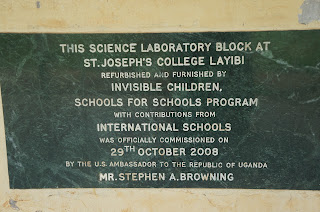30 June 2012
Second week of teaching did not really involve any teaching.
It is midterms which means that all grades except Senior4 (sophomores) and
Senior 6 (seniors) had three tests per day for the five days. I proctored the
Senior 1 (7th grade) history exam- this consists of passing out the
exam, going to the staff room for 1.5 hours and then going back to pick them
up-I left three rooms of 75-80 boys each alone in their rooms with an exam and
each time I went to check on them, it was quite as a church, pen to paper. No one
talks, no one cheats, no one gets up- and they are sitting three to a desk. I
really can’t do it justice here, it is one of those moments that I just went
“wow”. S 4 and 6 have mock exams
starting next week- basically like the PSAT except no multiple choice! These are the years that they take the
national exam to determine if they can either continue on to S5/6 (O level
exams) or go to university (A level exams). Basically their lives are
determined by a single exam. A similar process happens at university- if you
score well on the exams you can continue to study for law or engineering or
medicine- if not…(you get to be a teacher!)
We have been getting rain pretty consistently every day-
usually in the late afternoon or evening. On Wednesday we had a fabulous storm-
it started with about an hour of amazing lightning and thunder- several of us
just pulled chairs up on the porch and just watched the show. Then it started
to rain, first just drops and then pretty consistently. Jessica and I missed
dinner because we had been at Mother Theresa’s, so we ordered pizza from the
little restaurant across the road from us. When we left the rain was moderate,
by the time we crossed the street it was torrential. So we decided to eat
there. Again hard to describe but- torrential rain, metal roof, no windows, and
a frog hopping across the floor. TIA! (This is Africa). When we finally braved
the gullies, puddles and downpour- we ended up being locked out of the gate,
because the guards had disappeared.








































